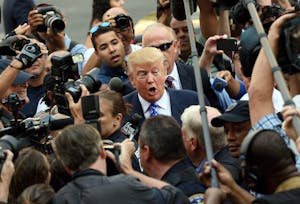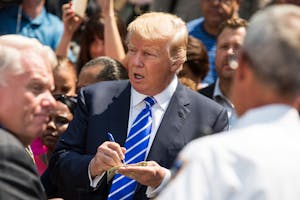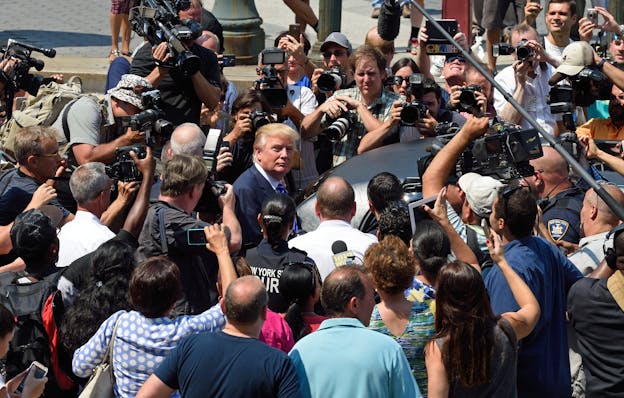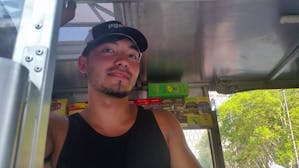Why am I here? That was the unescapable question facing me at 8 a.m. on Monday as I joined the dozens of reporters gathered at the New York State Supreme Court in Lower Manhattan to wait for Donald Trump, Republican presidential frontrunner, to report for jury duty. There was, of course, good money to be made on the presidential campaign that is the living breathing reductio ad absurdum of the idea that the American government should be run by a businessman and like a business. Paparazzi could sell photos. The coffee cart guy could sell more coffee. A man named Joe Lepore was there to support Trump and promote his own New York sightseeing bike tour.

But there were costs. Hundreds of journalist man-hours would produce countless nearly-identical images of Trump walking into the courthouse and waving his hand presidentially. Several police officers were deployed to secure the area, fencing a clear path through the middle of the reporters up the courthouse steps in case the building needed to be evacuated in an emergency. Some New Yorkers were late to work in order to observe the spectacle. Foreign tourists were delayed on their way to buying trinkets in Chinatown a few blocks north as they were roped into interviews with desperate reporters looking for a hot take from an average person on the 2016 election. The invisible hand has not yet brought rationality to the forces of supply and demand governing the burgeoning Trump sector of our economy.
I asked two local news cameramen what they hoped to film—what, in their wildest dreams, would they wish to come from this news event—and they eyed me warily as if I were out to steal a trade secret and devalue their labor with my Android phone. Did they want Trump to trip and fall on his face? The managers wanted that, the cameramen said. The reporters wanted “a story.” They just wanted a clean shot.
I had come because I think Donald Trump, whether he's in on the joke or not, is the most gifted political satirist of our time, and that makes his personal appearances worth attending and documenting. Every single thing he says merely strengthens my case. Last week, Trump's speech in Michigan rose to the level of art. A supporter held aloft a copy of Trump's 1988 book The Art of the Deal, and Trump said, in an exquisite parody of political faux populism, "That's my second favorite book of all time. Do you know what my first is? The Bible. Nothing beats the Bible. Nothing beats the Bible. Not even The Art of the Deal. You are going to love President Trump." How could you miss the chance to witness a moment like that?
What about everyone else? Among the many very serious rationalizations for this summer's Trump circus is the argument that he's leading the Republican field in national and early primary state polls, making him a serious contender. There's the argument that he gives voice to the enraged everyman out in Middle America who's sick of Washington gridlock and elites getting to play by a different set of rules. And there's the array of think pieces that argue Trump is important because he's the embodiment of something—he's the Fox News candidate, the professional wrestling candidate, the Howard Stern candidate, the Silvio Berlusconi candidate, the Seinfeld candidate, the candidate of the year 1985. As he prepared to run for president, Barack Obama wrote in The Audacity of Hope, "I serve as a blank screen on which people of vastly different political stripes project their own views." And to some degree, this is true of Trump, too. A woman named Sharon, who supports Bernie Sanders, came to see the Trump show "because he's exciting," and because, "I like some of the honesty. Like when he says, 'I gave money to these politicians so they would do these things'—those are things other politicians wouldn't say." He is, in other words, exactly what people want him to be. Let a thousand takes bloom.
Chaz Seward was at the courthouse to get a marriage license, but then he heard that Trump was coming, and thought he could get something else. "I'm gonna jump in front of him," Seward said. "I might get stun-gunned or something, but I'm going to jump in front of him, tell him, 'I'm getting married, man. I need a room tonight. I'm getting married, I want to have a honeymoon, sir. Can you give me a room for tonight? Just drop $200, $300 on me—it's gonna come back in taxes. Write it off, baby. Write it off." Had Seward been following Trump's presidential campaign? "Honestly? Hell no. But I need some dough. So today, I'm gonna be his No. 1 fan. Donald!"

Finally, Trump's limo arrived. Everyone smushed in together, so I smushed in also. A radio reporter narrated our progress: "He's signing autographs. ... This is amazing, this is truly amazing. ... We are in a group of reporters. I am in a herd following The Donald. I am in a herd following him up the— up the— up the stairs here of the state supreme court. I just hit a security guard in the head, probably not a great idea. I am in a herd going up the steps. Up the steps. Camera people... this is not safe."
Lepore got what he wanted. "Donald fist-bumped me! 2016 all the way, Donald! It's gonna be a landslide!! ... I got fist-bumped by Donald Trump, next president of the United States!" Again the radio lady's narration broke through: "Now he's turning around, looking very presidential. Waving to the crowd..." Lepore shouted, "I got fist bumped by Donald Trump!" Another reporter: "Which fist?" "His right fist." Lepore showed me afterward. He got it on tape. Pretty sweet.

Trump disappeared, and with the rest of the vultures I turned around, desperate for more original content to beef up my Trump vid. A young French girl with pastel hair was standing near me, so I accosted her, and begged to interview her, saying her hair looked so cool. She protested she didn't speak English that well. It didn't matter, I pressed "record" on my phone, and another reporter swooped in next to me to film her important thoughts on the American presidential election. She protested that she didn't know anything about American politics, either. No matter.
The crowd thinned, so I approached a witness who could not run away—the guy in the cart selling coffee and breakfast snacks. His name is Alonso and he does not think much of Trump. "I don't like him. He's a racist. ... He's trying to deport everybody, that's not right. Supposedly he's winning. I don't know how. It says a lot about America. ... I'm thinking the Republican Party is kind of racist towards minorities, since he's the one that's winning."

Alonso had never seen a crowd like this, not even when Tom Brady was here. "50 Cent was here too, two weeks ago," he said. The rapper is facing some sex tape–related legal trouble. "He actually bought something from here, a ginger ale. I was star struck."
The coldest economic analysis came from Peter C., a paparazzo who didn’t want to give his last name. Trump’s jury duty was not going to make Peter any money. “You see all these people here? That devalues it completely,” Peter said, gesturing toward the sea of newspeople with cameras. They would create an oversupply of Trump images that would drive down their price, Peter explained. "Say you’re trying to buy a bike off this kid for $500," he said. "But I have the same bike for $400. Who are you gonna buy it from? From me, right? All these people are going to have the same video or image or whatever, you know, so the price is going down and down for whoever has it." What he really wanted was an exclusive, a shot no one else has. "That’s where the money is honestly. Not this shit at all."
What if Trump tripped and fell right in front of him and he got the very best photo? "I dunno, it would go everywhere, but it wouldn’t be a $50,000 sale," Peter said. "There’s plenty of agencies here, there’s publications, so everybody’s gonna have this shit. Instead of buying it from you, they might be able to get it for free." I pressed him on this point: What if his competitors' photos were ugly while his was amazing and Trump was making the funniest face? I made some potential faces in the rage-pain range. "There’s a lot of variables, a lot of variables when it comes to this shit."
Okay, what if he got an exclusive of Trump making out with voluptuous bikini model Kate Upton? "That would be worth like $50,000," Peter said. "That shit would go everywhere. That shit would be worth fifty grand. That shit would be in every fuckin' magazine. She’s fuckin' cheating on Justin Verlander, it’s fuckin' Donald Trump, you know? That shit would be mad weird. That shit would be worth thousands upon thousands of dollars." You have to work smarter in the paparazzi business, Peter said, not harder. "You could take a thousand pictures and make $1,000. You could take a hundred pictures and make $1,000. You could take ten pictures and make $10,000."
But that was not going to come out of Trump's jury duty. Peter was there to build up another kind of capital. "I’m just here to prove to my agency that I’m out here getting shit. That I’m out here working. That I’m not dead."
His best recent shot was of Bill Clinton holding his granddaughter. Peter and a friend had been hanging out around Jennifer Lopez's place—she lives across the street from Madison Square Park. Some of the homeless guys in the park told them they'd recently seen the former president, which made sense, he said, because Chelsea Clinton lives in the same building as J.Lo. Homeless guys can be a good resource. "We got people everywhere. Doormen, garbage people, maintainance people, drivers. Everyone. Everyone can be bought."
But Peter hadn't invested much in building up Trump sources. "I don’t really care." Trump is a valuable commodity in political journalism, where glamour is scarce. Less so in Peter's paparazzi world, where actual sexy people sell. "For me and you it’s completely different," he said. "Oranges and apples."
